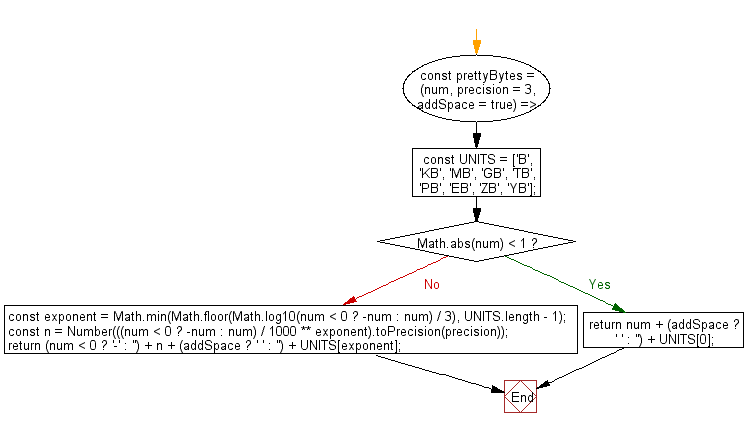JavaScript: Convert a number in bytes to a human-readable string
JavaScript fundamental (ES6 Syntax): Exercise-163 with Solution
Bytes to Human-Readable String
Write a JavaScript program to convert a number in bytes to a human-readable string.
Note: Use an array dictionary of units to be accessed based on the exponent.
- Use an array dictionary of units to be accessed based on the exponent.
- Use Number.prototype.toPrecision() to truncate the number to a certain number of digits.
- Return the prettified string by building it up, taking into account the supplied options and whether it is negative or not.
- Omit the second argument, precision, to use a default precision of 3 digits.
- Omit the third argument, addSpace, to add space between the number and unit by default.
Sample Solution:
JavaScript Code:
//#Source https://bit.ly/2neWfJ2
// Define a function 'prettyBytes' to convert a number of bytes into a human-readable string representation
const prettyBytes = (num, precision = 3, addSpace = true) => {
// Define an array of units in increasing order of size
const UNITS = ['B', 'KB', 'MB', 'GB', 'TB', 'PB', 'EB', 'ZB', 'YB'];
// If the absolute value of the number is less than 1, return it with the smallest unit 'B'
if (Math.abs(num) < 1) return num + (addSpace ? ' ' : '') + UNITS[0];
// Determine the appropriate unit based on the magnitude of the number
const exponent = Math.min(Math.floor(Math.log10(num < 0 ? -num : num) / 3), UNITS.length - 1);
// Calculate the value in the chosen unit with the specified precision
const n = Number(((num < 0 ? -num : num) / 1000 ** exponent).toPrecision(precision));
// Construct and return the human-readable string representation
return (num < 0 ? '-' : '') + n + (addSpace ? ' ' : '') + UNITS[exponent];
};
// Test cases
console.log(prettyBytes(1000)); // Output: 1 KB
console.log(prettyBytes(-27145424323.5821, 5)); // Output: -27.145 TB
console.log(prettyBytes(123456789, 3, false)); // Output: 123MB
Sample Output:
1 KB -27.145 GB 123MB
Pictorial Presentation:
Flowchart:

Live Demo:
See the Pen javascript-basic-exercise-163-1 by w3resource (@w3resource) on CodePen.
For more Practice: Solve these Related Problems:
- Write a JavaScript program that converts a byte count into a human-readable string using appropriate units (KB, MB, GB).
- Write a JavaScript function that formats a file size in bytes into a string with one decimal place and unit suffix.
- Write a JavaScript program that takes a number in bytes and outputs a localized human-readable format.
- Write a JavaScript program that converts large byte values to a readable string using logarithms to determine the unit.
Go to:
PREV : Async to Promise Conversion.
NEXT : Singular or Plural Form.
Improve this sample solution and post your code through Disqus
What is the difficulty level of this exercise?
Test your Programming skills with w3resource's quiz.
